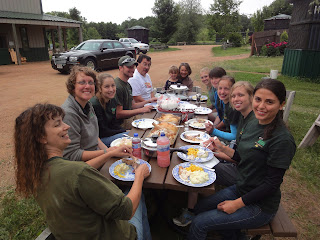- High Speed Migration -
REGI transporter? You 'betcha!
We are very lucky at REGI to have such a trustworthy batch of volunteer transporters! Our list stretches from the Milwaukee area to Minocqua, and we couldn't do it without every single one of them! This time of year, their phones are ringing off the hook with calls about injured birds and orphaned babies. It's not out of the ordinary for them to pick up several birds for us on their journey to REGI.
Our team meets Dave Piehler our transporter pilot!
This week, the interns learned that transport comes in all shapes and sizes. I'm not just talking about 2-door sports cars to the family friendly mini-van... I'm talking about the flying variety... with props and landing gear!!
Molly, Alyssa, Sarah, Aysegul, Dave P., Marge, Maddie, & Don with the new eagle patient
Dave P., Marge, and the patient
This isn't the first baby eagle of the season, although I'm sure he has had the fastest flight of the lot. Although he came to REGI a starving young eaglet, right now his future looks bright! You may have noticed a theme with this year's patient eaglets.
Emaciation (an extremely critical starvation), can happen for many reasons in the wild. Sometimes it's a health condition. Sometimes the stronger babies push their way into getting more food from the parents. Sometimes weak individuals are discarded by their parents. This is what makes animal rehabilitation so difficult. They can't open their mouths to explain their symptoms... we are left to make educated guesses based on history and research.
- PATIENT UPDATE -
Several of REGI's babies this summer are lucky enough to have foster parents. Species making the list are bald eagles, American kestrels, Eastern phoebes, American robins, crows, bluebirds, and many more.
Bald Eagle foster dad & female eaglet
This male
Bald Eagle is a foster parent to three young kiddos this summer. A huge part of being a foster parent is teaching the young ones what the different vocalizations mean. So far, it seems that the eaglets only know the food begging call!
American kestrels fostered by an education kestrel female
These
American kestrels have graced our blog several times now, but this is the first time you've seen them outside! They are getting SO big! Our female education kestrel is making a great foster mom for 4 fledglings!
Northern harrier baby admitted tonight
Feeding the Northern Harrier
You can see the crop (located on his neck) get bigger and bigger as it fills with food!
This little guy came to us from the Marshfield area. Many people don't realize that not all hawks nest in trees!
Northern Harriers (Marsh Hawks) nest in fields! Often times, the fields that provide the best cover for their nests are farmer's hay fields. This little guy's nest was run over by a baler. Unfortunately his siblings weren't as lucky as he is, but he's a fight
Molly McKay, REGI's education director, and intern Alyssa Z. at the turkey vulture portion of the tour
Thanks so much to the
Natural Resource Foundation for coming out today! It was hot, sunny, and information packed! This photo was taken during the turkey vulture portion of the tour. Many people find turkey vultures to be disgusting creatures because of what they eat (dead stuff)... but here at REGI we see vultures in a much different light!
This week we said happy birthday to intern Sarah! Look at those candles!
Enjoy they rest of your weekend... and keep your eyes peeled for injured wildlife over the 4th of July week. Fireworks are beautiful, but they have a tendency to create various issues in the world of wildlife!!
- Katie Rymer, Assistant Avian Rehabilitator





















.jpg)
.jpg)

.jpg)
.jpg)
.jpg)

.jpg)
.jpg)
.jpg)
.jpg)


.jpg)
.jpg)
.jpg)
.jpg)
.jpg)





.jpg)
















